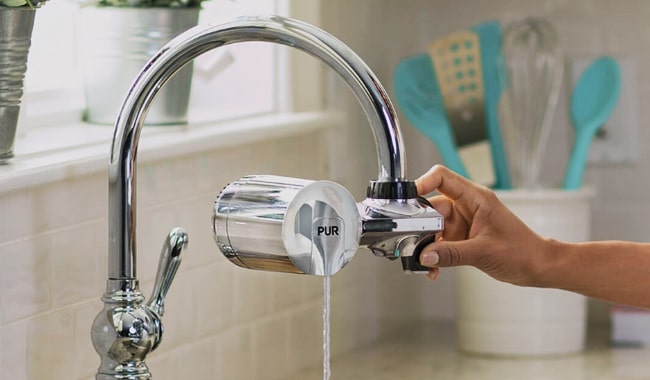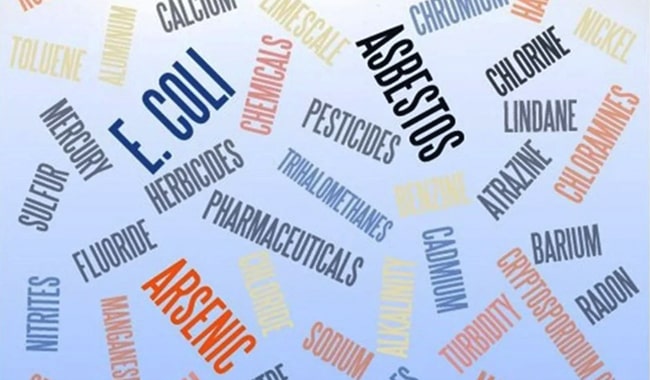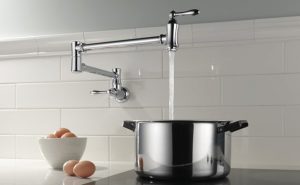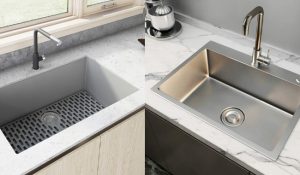Even though people get already treated supply water, every four out of ten American households prefer using a home water treatment unit of some kind.
Faucet filters are one of the most widely used water filters. There are some other kinds of filtration systems that are more effective than this one.
This makes some people doubt and raise the question, are faucet filters effective?
Is it worth investing the money in, or should I get a more expensive unit?
Well, we are about to figure out this query and all the confusions related to this water filtration system.

Difference Between Filtering and Purifying
As clean water is directly associated with our health, people don’t compromise doing the best possible thing to get the cleanest and purest water for the family.
But people often seem to not understand the terms filtering and purifying, and they tend to consider both the terms as the same thing.
Although we use them interchangeably, they highly differ from each other. It’s more like if we address every single vehicle on the highway as ‘truck’ no matter whether it’s a bike or a sports car. That makes no sense, right?
Similarly, filters and purifiers are totally different things.
Filtering is a process that takes out larger contaminants from already treated water. As the water is treated with bleach and other chemicals, it leaves an unpleasant odor that we get while drinking.
In addition to that, your treated water can also contain chlorine and lead, which isn’t good for your health either.
To filter chlorine and lead, and make the treated supply water odorless, we use filters such as faucet and pitcher filters. In addition to that, these filters also remove dust, dirt, germs, cysts, mercury, and similar contaminants from water.
On the flip side, purifying means when the filtration system takes out everything; even if it’s tiny particles in size, such as arsenic.
You need to purify water if it’s untreated or treated improperly. RO – Reverse Osmosis water purifying system is an ideal example of that.
There are lots of countries that supply their citizens treated water; still, the water seems to contain harmful elements, such as arsenic.
[Related: How to fix a unlimited turning faucet?]
So, How Effective Are Tap Water Filters?
The effectiveness of a faucet water filter depends on where you want to use it. As long as filtering treated water is concerned, you will get effective results. The filter will remove chlorine and lead, while also reducing greater numbers of sediments.
In addition to that, it will improve the overall taste and remove the chemical odor from the water as well.
You can effortlessly remove contaminants from your tap water and drink chlorine and lead-free tastier water. It’s the most inexpensive water treating tool that ensures you get healthier drinking water.
Using such a tool, you can improve the overall water quality by 20%.
But if you try to filter untested or untreated and highly contaminated water using a faucet filter, it is not going to work.
If your water tap supplies highly contaminated water, don’t invest in a faucet water filter. You need to look for a more advanced system such as RO – Reverse Osmosis that can effectively reduce 95% of contaminants and provide you the cleanest and purest water possible.
How Does a Faucet Filter Work?
Now that you get the complete picture of filtering and purifying water, it will be a lot easier for you to understand about the faucet filters.
What a faucet filter does is, it actually traps various sediment, such as dirt and sand. Also, it makes your water free of chlorine and lead. You can drink odorless and tastier water if you install a faucet filter on your kitchen sink tap or anywhere else.
Once you mount the filter onto the faucet tap, its metal or plastic housing surrounds the point that the water comes from.
Inside the housing, there is a filter cartridge that does all the filtering process for you. There are a few steps involved in this filtration process –
Sediment Removal
When you turn the tap on, the water flows through a non-woven screen that is wrapped around the filter cartridge. This screen traps dirt, sand, and other small sediments.
Activated Carbon Block
Once the water is clear of sediments, this time, it has to go through a compressed activated block of zeolite and carbon.
There are millions of tiny little pores that make it a porous surface, which is filled with crannies and nooks. When the water passes through this step, crannies and nooks trap the water contaminants, and effectively remove chemicals, mostly lead and chlorine.
If the water passes slowly through this block of carbon, it removes more chemicals. When this surface of activated carbon is filled with contaminants, you will not get effective results unless you clean or change the cartridge.
More advanced faucet filters have additional layers that remove more contaminants than ordinary ones.
Some models have pre-treated activated carbon that impregnates another substance into the carbon to make filtration more effective. To kill fungi and bacteria, some manufacturers add sliver to the filter.
Chemical Removal

The final step reduces a significant amount of chemicals. Although activated carbon can handle most contaminants, it doesn’t perform great when it’s about to deal with magnesium, calcium, and other substances.
This step makes sure that you get odorless tastier water every time.
How much contaminants will be trapped depends on how long the water contacts with the cartridge. Slow flowing water comes out cleaner than water that flows fast.
That’s the reason why many models let the water pass through the tap slowly that ensures cleaner water.
Final Words
If you ever come across someone asking ‘how effective are the faucet filters?‘, hopefully, you will be able to make the person clear about the whole thing.
Even if you get clean tap water, there will still be some chlorine and lead followed by sourness. A faucet filter is the thing that you can trust regarding this matter without a doubt.
Related Articles:

Porcelain Vs. Stainless Steel Kitchen Sink – Detailed Comparison
A well-structured and installed kitchen sink has the power to enhance the look of a kitchen. The materials used to make a sink play a

What is the Standard Kitchen Faucet Size?
You might grab the best kitchen faucet from the market but still it can be an epic failure. Because, it depends on your requirements and

Are Delta Faucets Worth It?
Founded in 1929, Delta Faucet Company is one of the oldest plumbing fixture companies in the world. Though the company primarily serves the North American

Moen vs Kohler Kitchen Faucet (Which One to Choose?)!!!
The main difference between Moen and Kohler Kitchen Faucets is the price. Though Kohler faucets are more expensive, they are of top-notch quality. On the

The Best 9 Kitchen Faucets Brands Made in USA
Moen, Kohler, and Brizo are the top made-in-America kitchen faucet brands. Here are the top 9 best kitchen faucet brands reviewed with their pros and

Granite Composite Vs Stainless Steel Sinks
Sinks are permanent fixtures in your kitchen, so a little bit of caution before the purchase brings fruition. Both granite and stainless steel make a

